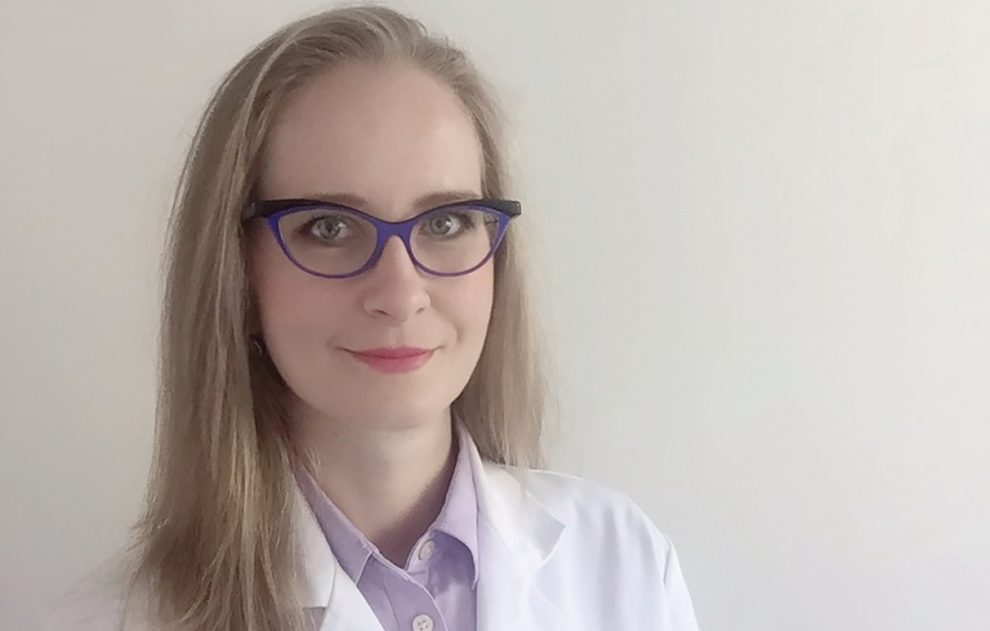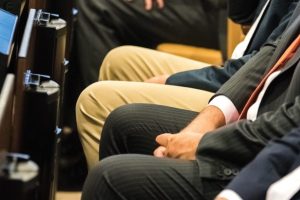Becoming a physician was never Marta Kokoszynska’s plan. “I was a math nerd,” she says. But throughout her journey emigrating to the United States and her pursuit of a bachelor’s degree in mathematics and economics at New York University, Kokoszynska felt her faith calling her to something deeper: to help others. She answered that call the day she entered medical school and continues to answer it every day she spends working on the front lines of the COVID-19 crisis as a pulmonology and critical care specialist.
Escaping political persecution in Poland in the 1980s, Kokoszynska and her family emigrated to the United States when she was 8 years old. Here they joined her father, who had been a political refugee in New York City for five years. The family leaned on their Catholic faith to make it through the difficult transition of starting a new life.
“At that point, my parents had been physically separated for five years. Because of the secret police in Poland around that time, they couldn’t really communicate with each other,” Kokoszynska says. “Faith is what kept my dad faithful to his wife, to his family, to what they were trying to accomplish. When we came back together, I think faith is what kept us going. It was kind of the glue for our family.”
“Faith is what kept us going. It was kind of the glue for our family.”
Advertisement
Growing up, Kokoszynska and her family prayed the rosary together every night and were regulars at Sunday Mass and different devotions. “Growing up Polish,” she says, “we had a pretty strong faith in the family, especially when I was younger.”
Kokoszynska attended New York University to study mathematics and economics. Toward the end of her studies, she was accepted to business school at NYU. However, Kokoszynska didn’t feel fulfilled by what she was doing. “Something in my heart was just not sitting right,” she says. “I wanted more out of my career. I wanted something different.”
During that time, Kokoszynska recalls being “too scared to pursue medicine,” so she began volunteering wherever she could—nursing homes, private clinics, and hospitals. Encouraged by her mother, who was a critical care nurse, she still felt uncertain about a career in medicine. “I just could not fathom making decisions for a human being about their health and life,” she says. “It was just so out of reach.”
Kokoszynska worked as a project manager at an advertising agency for two years before finally committing to study medicine. Looking back, she realizes it was her faith that guided her to make that decision amid so much internal uncertainty. “At that time I really didn’t realize that God was calling me for something deeper. I still lived with the thought that ‘this [medicine] is not meant for me,’ ” she says. “But somehow doors kept opening, and I kept seeing God coming in at the appropriate times and leading me into the [medical] specialty I am in right now.”
She again found herself called to something deeper: to find a way to infuse her faith into her day-to-day work life.
Although the stress of medical school and the demands of being a practicing physician put her faith on the back burner for a time, Kokoszynska continued to attend Sunday Mass and pray at home after work. But she again found herself called to something deeper: to find a way to infuse her faith into her day-to-day work life.
“I was no longer satisfied with just going through the motions of the day to day. It felt like my soul craved something more,” she says. “Even though [doctors] deal with joy, healing, pain, suffering, and death on a regular basis—and it may seem like an easy transition to faith—the medical aspect often felt very demanding, isolating, and all-consuming. It felt like two parallel roads that just were not blending.”
Kokoszynska began making a conscious effort to find small moments during her day for prayerful reflection and time with God. Through these moments, she began to feel true unity between her work and her faith—and, ultimately, real growth in both areas of her life.
“Some of the most powerful prayer moments for me are when I am stressed out, hungry, haven’t peed in three hours and in the corner of an elevator of the hospital riding up to the intensive care unit. I take a deep breath and just rest in God’s presence,” she says. “I have learned in these small moments how God speaks in the silence of our hearts, even if it’s just for a few minutes.”
“I have learned in these small moments how God speaks in the silence of our hearts, even if it’s just for a few minutes.”
Kokoszynska has leaned on her faith immensely over the last several months, treating critically ill patients with COVID-19. Although her work has certainly been challenging, she sees it as another call to continue strengthening her relationship with God. “I love taking care of the sickest patients, and I love the physiology of the lungs,” she says. The challenges Kokoszynska has faced have taught her to “turn each day into a conversation with God,” no matter how difficult it may seem.
Kokoszynska also continues to strengthen the relationship between her faith and her work by spearheading the establishment of a chapter of the Catholic Medical Association (CMA) in Vermont. Although the COVID-19 crisis has slowed her plans, she hopes the CMA chapter will help connect Catholic physicians across Vermont both professionally and personally by offering networking opportunities as well as support and prayer groups.
“I realized that the only way I’m going to survive as a young physician and practicing Catholic is to surround myself with a strong Catholic community that truly understands the emotions I go through on a daily basis.”
As Kokoszynska continues to live and practice medicine in Vermont, she is ready for wherever her faith leads her next. She has come to accept her work as a physician as her vocation. “I really don’t consider it a career,” she says. “It truly is a calling.”
This article also appears in the September issue of U.S. Catholic (Vol. 85, No. 9, pages 45-46). Click here to subscribe to the magazine.
Image: Courtesy of Marta Kokoszynska














Add comment